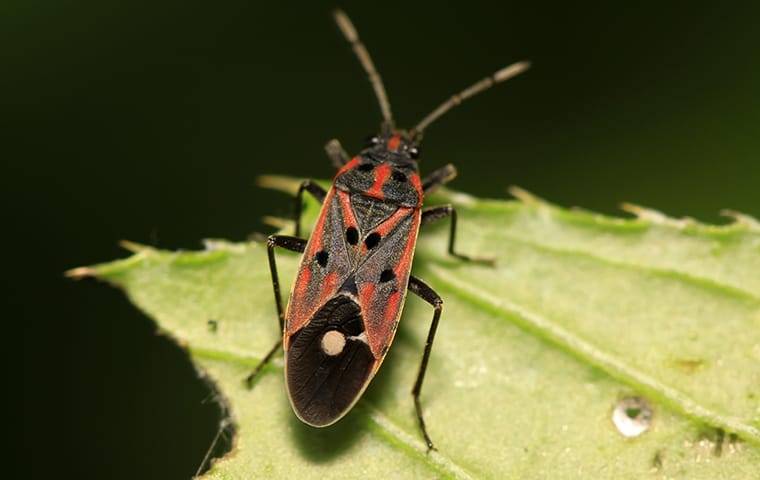
Lawn Pest Identification & Prevention
What are lawn pests?
As their name suggests, lawn pests are those insects and other organisms that feed on and cause damage to lawns and ornamental plants. Healthy lawns are incredibly beneficial because they provide oxygen, help prevent erosion, filter toxins, and of course, add to your home’s curb appeal! Unfortunately, healthy lawns often attract lawn-destroying organisms. A yard that has become home to lawn pests can quickly turn from lush and flourishing to unsightly and unhealthy.

Some of the most common species of lawn pests living throughout our area of Southeast Florida include the following:
Chinch bugs
These tiny insects thrive in the warm, humid weather that Southeast Florida provides throughout the summer months. They are black with white wings that overlap their bodies, and their legs are light brown; nymphs are orange in color.
Grubs
Lawn grubs, or white grubs, are the larvae of June beetles. These grubs are plump and white in color, and curl into a C-shaped position. Their hind ends have a dark area, and their heads are brown.
Mealybugs
These insects thrive in warm, humid climates, and are plant-sucking pests. Mealybugs have soft, oval-shaped bodies covered in a waxy material.
Scale fungi
These are sap-feeding insects. Their bodies have a waxy scale-like coating that conceals and protects them.
Sod webworms
These caterpillars are cream-colored with dark brown spots on each body segment, and their heads are a dark yellowish-brown.
-
How can I prevent lawn pests in the future?
Preventing problems with lawn pests on your Lake Worth or Southeast Florida property is a difficult task, but here are some steps you can take to help avoid an infestation:
- Inspect your lawn regularly for signs of an infestation or damage.
- Water your lawn when necessary; avoid overwatering.
- Aerate your lawn in the spring to make it less favorable to invading lawn pests.
- Maintain your lawn with proper mowing techniques and keep your grass trimmed short.
-
How do I get rid of lawn pests?The best way to eliminate problems with lawn pests in your Southeast Florida home or business is to partner with an experienced professional. At Pest-Aside, we offer the residential and commercial pest control services needed to get rid of lawn pests and other common Florida pests at an affordable price. We are 100% committed to our customers and their pest control needs. To learn more about our pest control services, contact Pest-Aside today!
-
Where will I find lawn pests?Where you find lawn destroying organisms depends on their exact species and feeding habits. Chinch bugs prefer grass that is growing in full sunlight; both nymphs and adults feed on the base of grasses, preferring St. Augustine grass. Grubs mainly feed on the roots of grass and small plants. Mealybugs are a big problem on fruit trees, ornamental plants, and some perennials. Scale fungus feeds on fruit trees, shade trees, shrubs, and houseplants. Sod webworms feed on warm-season turf grasses and are a problem for newly planted lawns, golf courses, and athletic fields.
-
Why do I have a lawn pest problem?The reason you have a problem with lawn pests is that your property offers them ample food sources. Lawns, plants, and trees that are green and healthy are highly attractive to them. Healthy plants provide lawn-destroying organisms the nutrients they need to grow and develop. At Pest-Aside, we can help you with all your home lawn and pest control needs.
-
Are lawn pests dangerous?
Lawn pests pose no direct danger to people, but they represent a significant threat to our yards, landscapes, and bank accounts. For example, chinch bugs are small insects but are responsible for causing millions of dollars in lawn damage each year. Lawn pests and their feeding habits cause plant death; they can turn a green lawn into a brown one almost overnight. Additionally, lawn pests attract other pests to your yard.
Heavy infestations of lawn grubs can attract crows, raccoons, skunks, and other wild animals. These animals will dig up your lawn while foraging for grubs to feed on. When feeding on plants, scale insects produce honeydew – a sweet, sticky substance. Honeydew on plants encourages fungus growth, which gives plants a black, soot-like appearance.

Hear From Our Happy Customers
At Pest-Aside, Inc., your satisfaction is our priority! See for yourself what our customers have to say about working with us.
-
“Fast, friendly and efficient.”- Vanessa D.
-
“Pest-ASIDE is an outstanding pest control service.”- James W.
-
“I have been relying on AAA Riteway for over ten years to keep crawling critters out of my house.”- Nancy S.